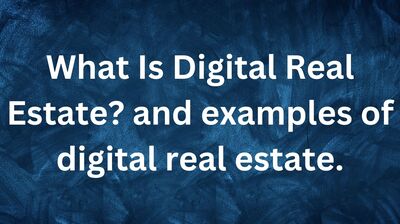Understanding Digital Real Estate: Definition and Examples
- Introduce the concept of digital real estate and its growing prominence in the online marketplace.
- Explain how digital real estate encompasses virtual assets that hold value and generate income, similar to physical properties in the real world.
- Provide an overview of the article’s content, which will define digital real estate and provide examples to illustrate its diversity and potential.

Definition of Digital Real Estate:
- Define digital real estate as virtual assets, such as websites, domain names, social media accounts, and digital products, that hold value and generate income.
- Discuss the similarities and differences between digital and physical real estate, emphasizing the importance of online presence and visibility in today’s digital economy.
Examples of Digital Real Estate:
a. Websites:
- Explain how websites serve as digital storefronts and online assets that can be monetized through various means, including advertising, affiliate marketing, e-commerce, and subscription services.
- Provide examples of profitable website niches, such as blogs, online stores, niche communities, and informational resources.
b. Domain Names:
- Discuss the value of premium domain names as digital assets that can be bought, sold, and leased for profit.
- Highlight examples of high-value domain names and their potential to attract organic traffic, enhance brand recognition, and command premium prices in the resale market.
c. Social Media Accounts:
- Explore the role of social media accounts, such as Facebook pages, Instagram profiles, and YouTube channels, as digital real estate assets with monetization potential.
- Discuss how social media influencers leverage their online presence to build audiences, engage followers, and monetize their content through brand partnerships, sponsored posts, and affiliate marketing.
d. Digital Products:
- Define digital products as downloadable or online-accessible assets, such as e-books, courses, software, and templates, that provide value to consumers and generate revenue for creators.
- Showcase examples of successful digital products and their creators, highlighting the scalability and passive income potential of digital product sales.
Investment Opportunities in Digital Real Estate:
- Explore the investment potential of digital real estate and its appeal to entrepreneurs, investors, and content creators seeking passive income streams and long-term wealth accumulation.
- Discuss the benefits of diversifying investment portfolios with digital assets and the advantages of owning digital real estate in terms of scalability, accessibility, and low overhead costs.
Conclusion:
- Summarize the key points discussed in the article and reinforce the importance of understanding digital real estate as a valuable asset class in the digital economy.
- Encourage readers to explore opportunities in digital real estate, leverage their online presence, and capitalize on the diverse range of digital assets available for investment and monetization.

